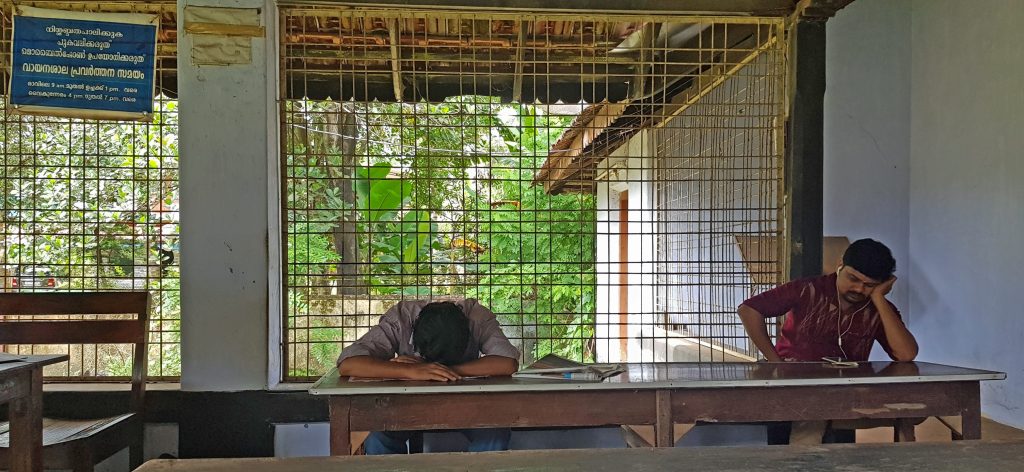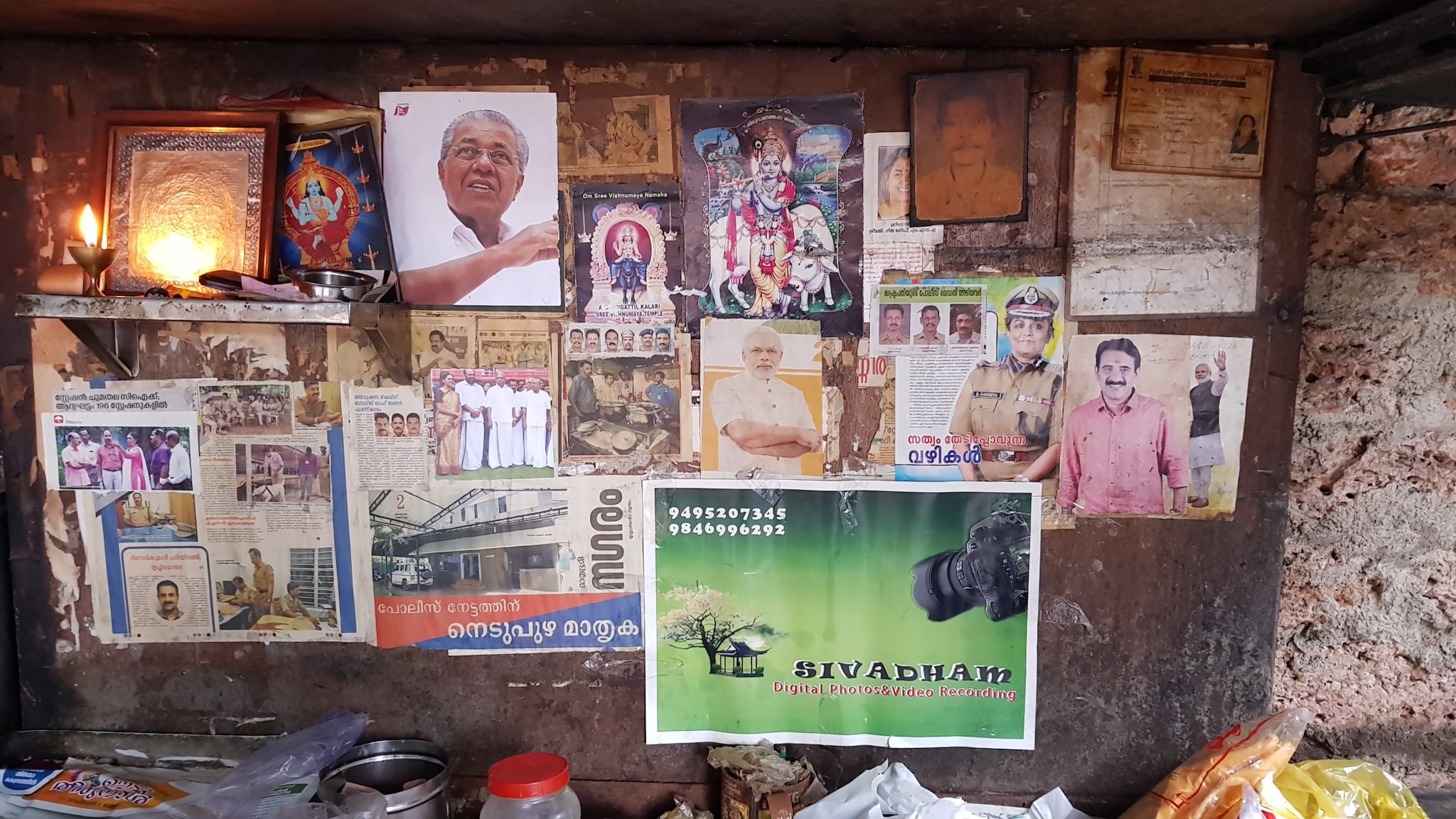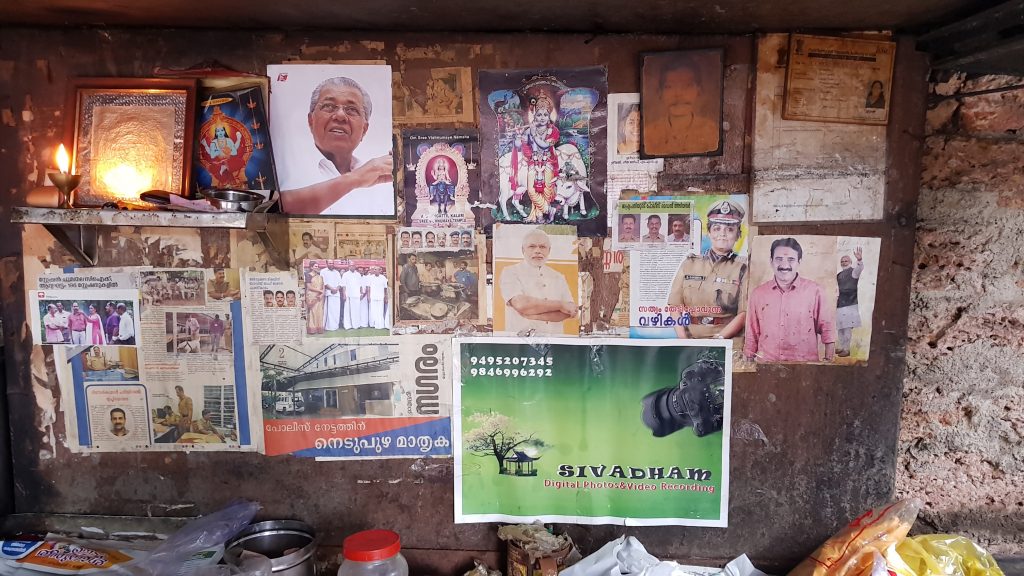by Harikrishnan Sasikumar, doctoral candidate at IICRR
The District Central Library in Kannur in the north of Kerala – a narrow coastal state on the south-western coast of India – is a two-storied building on a busy main-road near Gandhi Circle. When I visited it in summer this year, a big room just beyond the main entrance was being painted. Wooden tables and benches were temporarily moved to a little courtyard in the front where about a dozen people sat with various newspapers which they all took turns to read. In a small group, some of them were discussing events from the day’s Malayalam newspapers – mostly politics. This is a familiar scene in many reading rooms across Kerala. ‘Public libraries acted as public spaces beyond political differences’, the Secretary of the Council Library told me. For about a century now, these spaces have nurtured debates, discussions and deliberations that contributed to the formation of a democratic, progressive and rational political culture.

Till about two centuries ago, Kerala was among the most traditional regions of the country, with deep caste cleavages and very rigid laws of purity and pollution that divided the Hindu populations. Strict adherence to caste hierarchy averted direct confrontation between communities and prevented any challenge to status quo. From the 19th century onwards, however, various changes like modern education, social reform movements and democratisation led to intense conflicts between tradition and modernity in the state. Over the 20th century, Kerala went on from being tagged as a ‘mad-house of caste’ to being one of the most politically charged, secular and socially developed states in the country. Today, it is quoted to be among the most communally plural and tolerant states in India. Despite being a conservative society with a large proportion of religious followers, the state has managed to maintain a relatively clean sheet when it comes to communal violence over the last century. Barring a few sporadic incidents, communal conflict has remained largely at bay.
How Kerala succeeds in this paradox of conservative progressiveness (or progressive conservatism?) is a long-standing debate. But the more one observes, the more one can see that there is one inevitably strong realm that helps maintain this balance – that of the ‘public sphere’ that has encouraged active public involvement through more or less democratised communicative action. Here, communicative action is used to mean that participants justify their validity claims in front of an ideally extended audience. (1) In Kerala, the public sphere acts as a cushion, a buffer that maintains a balance between the conservative and the progressive trends in society by separating the ‘private’ from the ‘public’. Most importantly, it is the democratic space where differences are engaged with, discussed, debated, and deliberated. And public libraries and reading rooms have spearheaded the movement.
Apart from reading rooms, small wayside tea stalls in Kerala – popularly (and lovingly) called chaayakkada – have played a pivotal role in challenging caste hierarchies from early 20th century, by becoming secular public spaces that allowed free interactions between a fast-changing traditional society, and a reformist modern one. They evolved as informal secular spaces where people of all religions, castes and classes could engage as equals; as customers. Consequently, they became spaces where political ideas were introduced, exchanged, and debated. Different cities in Kerala have urban legends of the tea-shops that had signboards prohibiting political discussions because they went out of hand and ended up in a fight.
During my trip this summer, I liked visiting the tea-stall near the library I frequented for my work. One evening, I met two middle-aged men dressed in white sitting at the stall, talking to each other about the problems of the Congress Party, and why the party needs new leaders. In India, this is a discussion that almost everyone has probably engaged in over the last few years – on the internet, at dinner tables, or even during a break at work. But the two men, both local level party workers themselves, were engaged in a passionate exchange of words when the owner of the shop intervened with his two opinions on the matter. Soon, there was a little group of people – all customers or onlookers – who engaged with their opinions on the topic. Not all of them supported the same political party, but everybody had some shared common ground on what was good for society.
Transformations in the Public Sphere
For about three decades now though, these spaces have been dwindling in numbers in Kerala. The tea-shops are increasingly being replaced by suave coffee-shops, and reading rooms have become spaces for older people to while away the hours. Televisions have changes how people consume news. Interestingly, however, the conventional forms of political spaces continue to be adapted into television. Before the last state elections in Kerala in 2016, one of Kerala’s leading news channels produced a special programme with a ‘heady brew of politics, music and, of course, tea’, where they brought together people from the village belonging to different backgrounds to discuss the political atmosphere leading up to elections. Another very popular television programme that has been running for 17 years – Munshi – is a satire that discusses matters of socio-political relevance as a brief sketch between characters from different religious and political backgrounds – there’s a Muslim, a Hindu priest and a Christian, but also a communist and a congress party man. In an interview, Munshi’s director Anil Banerjee said that this set out a balanced secular atmosphere and gave it a collective sense of completion. The discussions happen in an open farmland or a field, and each episode ends with the wise elder character Munshi summing up the discussion with a quirky proverb.

Sign on the top left reads: ‘Maintain silence, Do not smoke, Do not use mobile phones’
Despite the wide-reaching changes that have marked the last three decades in Kerala, trails of an old but dying space can still be found. Most times, they have transformed into new or social mediums, but the long standing legacy of the old and effective system continues to struggle for space. In their new forms, the spaces have become increasingly accessible to those excluded from it earlier – especially women, who have almost entirely excluded from such spaces in the past.
Meanwhile, the tea shop (with its reduced audience) continues to be a vibrant secular space that transcends political, caste, religious differences, and this very important role it plays is best reflected on a wall in the stall. Among newspaper clippings of various local events, achievements of a woman police officer, advertisements of a photographer and pictures of various Gods, politicians from across the major political parties in Kerala shared a space on the same wall. Amidst the chaos and clutter, each enjoyed their negotiated boundaries while still sharing a common space.
Reference:
- Habermas, J (1996), Between Facts and Norms: Contributions to a Discourse Theory of Law and Democracy, (trans. by William Rehg), MIT Press, Massachusetts p.322





